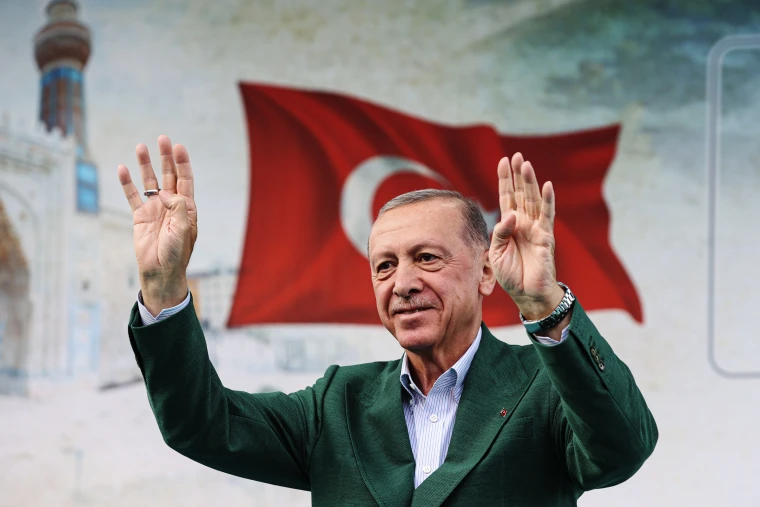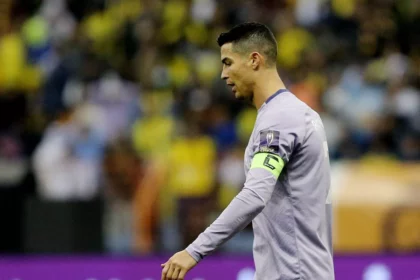In a closely contested runoff election, Turkish President Recep Tayyip Erdogan emerged victorious, extending his transformative but divisive rule for another two decades until 2028. Overcoming Turkey’s severe economic crisis and the most formidable opposition alliance his party has ever faced, Erdogan maintained his unbeaten record in national polls. The streets reverberated with car horns and tributes poured in from around the globe as Erdogan, regarded as Turkey’s most influential leader in modern history, celebrated his hard-fought election win atop a bus in Istanbul.
Addressing his ecstatic supporters and leading a chorus of his campaign song, Erdogan declared, “We will be ruling the country for the coming five years. God willing, we will be deserving of your trust.” The near-complete results showed Erdogan surpassing his secular opposition rival, Kemal Kilicdaroglu, by a narrow margin of four percentage points. International leaders expressed their support for Erdogan, with Russian President Vladimir Putin commending his efforts to strengthen state sovereignty and pursue an independent foreign policy. Ukrainian President Volodymyr Zelensky expressed his desire to continue working with Erdogan for the security and stability of Europe, while German Chancellor Olaf Scholz hoped for a fresh impetus in advancing their shared agenda.
Former US President Donald Trump, a close ally of Erdogan during his second decade of rule, celebrated Erdogan’s “big and well-deserved victory.” The election win brought the bustling streets of Istanbul’s Taksim Square to a standstill, as jubilant crowds of singing and flag-waving supporters gathered outside the presidential palace in Ankara. The people’s trust in Erdogan was palpable, as 17-year-old Nisa Sivaslioglu exclaimed, “Our people chose the right man. I expect Erdogan to build upon the positive changes he has already brought to our country.”
This election marked a pivotal moment in Turkey’s 100-year history as a post-Ottoman republic, with Erdogan facing unprecedented challenges. Kilicdaroglu, the opposition candidate, pushed Erdogan into Turkey’s first-ever runoff and managed to narrow the margin further in the second round. Opposition supporters saw this as a do-or-die opportunity to prevent Turkey from sliding into autocracy under a leader whose consolidation of power rivals that of Ottoman sultans. Kilicdaroglu’s brief concession statement expressed deep concern about the significant difficulties awaiting the country under Erdogan’s continued rule.
Kilicdaroglu adopted a different approach after the first round, transforming his message of social unity and freedom into fervent speeches advocating for the immediate expulsion of migrants and intensified counterterrorism efforts. This right-wing shift aimed to appeal to the nationalist demographic, which emerged as the major winner in the parallel parliamentary elections. However, analysts remained skeptical about Kilicdaroglu’s strategy. His informal alliance with a pro-Kurdish party, portrayed by Erdogan as the political wing of banned militants, exposed him to allegations of collaboration with “terrorists.” Furthermore, Kilicdaroglu’s attempt to court Turkey’s hard right was hindered by the endorsement Erdogan received from an ultra-nationalist candidate who finished third in the previous round.
Galip Dalay, an associate fellow at Chatham House, noted that Erdogan skillfully played the nationalist card, overshadowing the opposition’s narrative despite the country’s challenging economic situation. Erdogan has been hailed as a champion by the poorer and more rural segments of Turkey’s fractured society, thanks to his focus on promoting religious freedoms and modernizing dilapidated cities in the Anatolian heartland. However, his crackdown on dissent and assertive foreign policy have raised concerns in the Western world. His military incursions into Syria, which drew the ire of European powers, and his alignment with Putin despite the Kremlin’s war on Ukraine have strained Turkey’s relations with the international community.
Turkey’s troubled economy poses an immediate and significant test for Erdogan’s leadership. In 2021, Erdogan went through a series of central bankers in pursuit of slashing interest rates at any cost. However, this policy led to a freefall of Turkey’s currency, with the annual inflation rate reaching a staggering 85 percent last year. Erdogan remains steadfast in his commitment to these policies, rejecting economic peril predictions from analysts. In the lead-up to the election, Turkey expended billions of dollars in an attempt to support the lira, which was politically sensitive. Analysts now argue that Turkey must either increase interest rates or abandon its efforts to bolster the currency.
As analysts at Capital Economics caution, the “day of reckoning” for Turkey’s economy and financial markets may be looming. The next few years will undoubtedly test Erdogan’s leadership and ability to navigate the challenges facing Turkey on both the domestic and international fronts. With his extended rule, Erdogan carries the responsibility of shaping Turkey’s trajectory and addressing the pressing issues that lie ahead.




